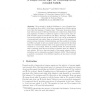Free Online Productivity Tools
i2Speak
i2Symbol
i2OCR
iTex2Img
iWeb2Print
iWeb2Shot
i2Type
iPdf2Split
iPdf2Merge
i2Bopomofo
i2Arabic
i2Style
i2Image
i2PDF
iLatex2Rtf
Sci2ools
ECSQARU
2009
Springer
2009
Springer
A Simple Modal Logic for Reasoning about Revealed Beliefs
Abstract. Even though in Artificial Intelligence, a set of classical logical formulae is often called a belief base, reasoning about beliefs requires more than the language of classical logic. This paper proposes a simple logic whose atoms are beliefs and formulae are conjunctions, disjunctions and negations of beliefs. It enables an agent to reason about some beliefs of another agent as revealed by the latter. This logic, called MEL, borrows its axioms from the modal logic KD, but it is an encapsulation of propositional logic rather than an extension thereof. Its semantics is given in terms of subsets of interpretations, and the models of a formula in MEL is a family of such non-empty subsets. It captures the idea that while the consistent epistemic state of an agent about the world is represented by a non-empty subset of possible worlds, the meta-epistemic state of another agent about the former’s epistemic state is a family of such subsets. We prove that any family of non-empty s...
| Added | 24 Jul 2010 |
| Updated | 24 Jul 2010 |
| Type | Conference |
| Year | 2009 |
| Where | ECSQARU |
| Authors | Mohua Banerjee, Didier Dubois |
Comments (0)

